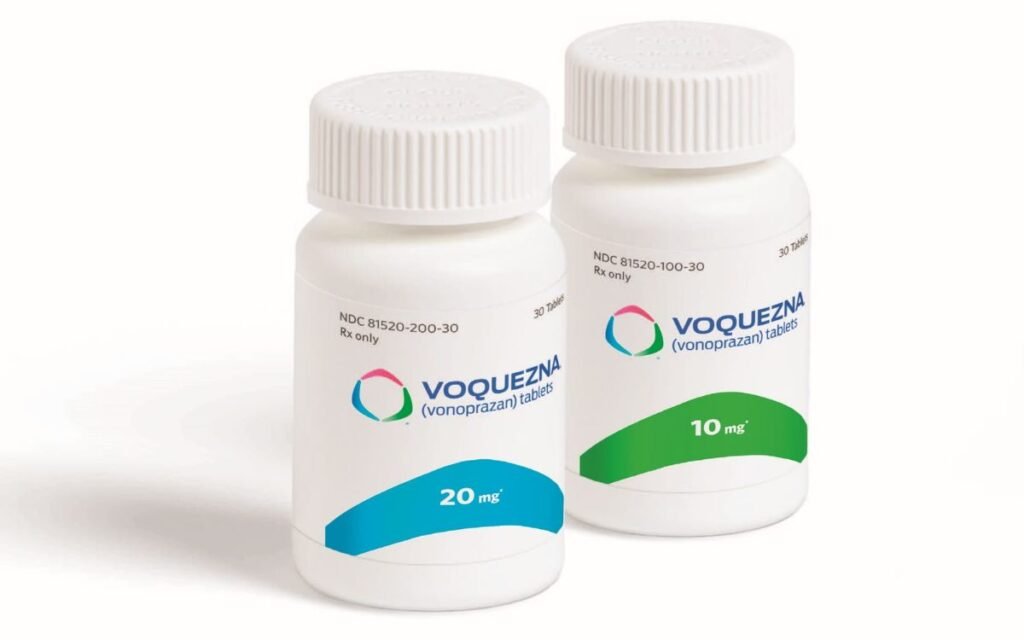Phathom Pharmaceuticals has achieved rapid success with its innovative heartburn medication Voquezna (vonoprazan), securing two FDA approvals in just three days.
On Monday, the FDA gave its nod to Phathom’s new formulation of Voquezna for the treatment of Helicobacter pylori infection, followed by a second endorsement on Wednesday for its use in treating erosive gastroesophageal reflux disease (GERD) and its associated symptoms.
This double approval within a single week is an extraordinary event. Initially, the FDA had approved Voquezna for H. pylori in the previous year, but later rescinded the approval and halted the company’s launch plans due to the detection of trace amounts of a carcinogenic substance in the drug’s commercial batches.
During this pause, the FDA had also frozen Phathom’s submission for Voquezna’s use in erosive GERD. In April, after receiving full response letters for both cases, Phathom presented stability data to the FDA, which confirmed that Voquezna’s tablets could remain within safe levels of daily intake for the impurity nitrosamine N-nitro-vonoprazan, leading to the revival of the company’s FDA applications.
Also Read: Phathom Pharmaceuticals Boosts Erosive GERD Application With Six-Month Stability Data Submission For Vonoprazan
With these new approvals, Voquezna has set a benchmark in the US as the first acid suppressant proven to be more effective than proton pump inhibitors (PPIs) across various conditions. This marks a significant advancement in acid suppression therapy, the first in thirty years.
Phathom reported that there are 20 million people in the US undergoing treatment for acid-related gastrointestinal issues. The company is prepared to immediately distribute Voquezna for those with erosive GERD and plans to release it for H. pylori patients by December. Phathom has deployed a 320-strong sales team for the task.
The treatment, available in both 20-mg (healing) and 10-mg (maintenance) doses, will be priced at $650 for a 30-dose bottle, as announced by Phathom.
“This approval demonstrates Phathom’s commitment to changing the GI treatment landscape for patients and healthcare providers, bringing the first major innovation to the US Erosive GERD market in over 30 years. Erosive GERD can be extremely painful and often has a significant impact on patients. Research has shown patients and healthcare providers are largely unsatisfied with current treatments and we are excited about the approval of a first-in-class treatment option that has the potential to meet a large unmet medical need.”
– Terrie Curran, President and Chief Executive Officer at Phathom
Furthermore, Phathom is pursuing another potential use for Voquezna in treating non-erosive GERD, anticipating an FDA verdict in the latter half of the next year. The company projects a peak sales target exceeding $3 billion for Voquezna.
Despite the presence of over-the-counter options, Phathom emphasized that prescriptions drive 85% of PPI sales volume.
Also Read: How Heartburn Medicine May Increase Your Risk Of Dementia
The approval for erosive GERD was informed by a study involving 1,024 patients, comparing vonoprazan to the PPI lansoprazole, showcasing a 93% healing rate with a daily 20-mg dose of vonoprazan, contrasted with an 85% healing rate using a 30-mg dose of lansoprazole. For long-term treatment, a 10-mg dose of vonoprazan also proved more effective than a 15-mg dose of lansoprazole over six months.
“For many GERD patients with Erosive Esophagitis, the response to current treatment is suboptimal, leaving them with incomplete healing and ongoing symptoms. The FDA approval of VOQUEZNA (vonoprazan) provides healthcare providers with a new first-in-class therapeutic option that demonstrated faster healing in the more difficult to treat GERD patients with Erosive Esophagitis. In addition, VOQUEZNA (vonoprazan) provided superior maintenance of healing in all grades of Erosive Esophagitis, compared to lansoprazole, a commonly prescribed PPI, and provided 24-hour heartburn relief on most days in the trial.”
– Colin W. Howden, MD, Professor Emeritus, University of Tennessee College of Medicine
Vonoprazan operates by selectively inhibiting the potassium-binding site of the proton pump, which is the enzyme that primarily controls the secretion of stomach acid.
Originally a subsidiary created by Takeda, Phathom was formed with the specific goal of advancing and commercializing vonoprazan outside of Asia, where the drug is already available.





























